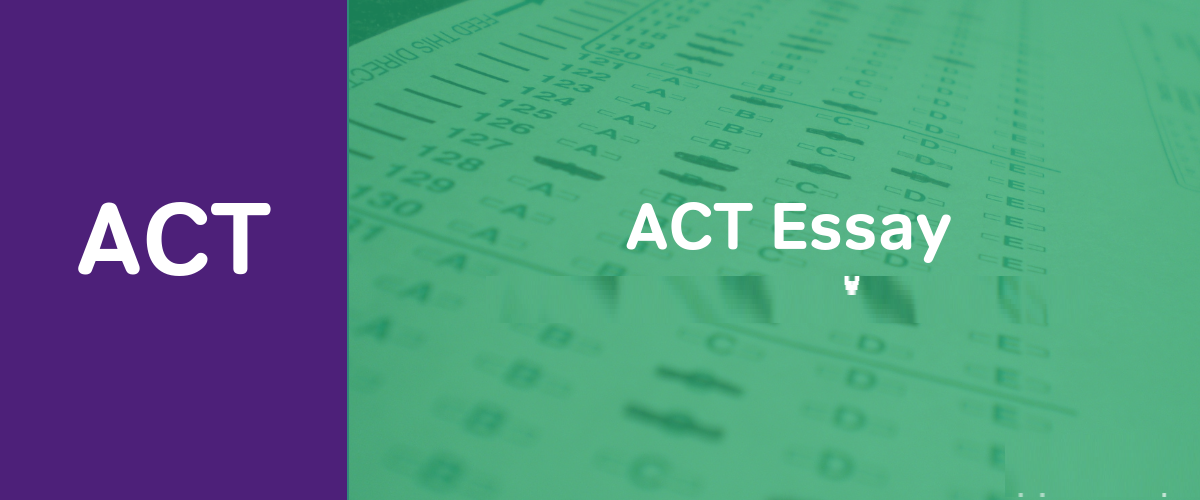Forty-five minutes and one impressive, top-scoring essay to write. If you attempt the ACT essay without a strategy, you’ll find yourself running out of both time and words. To save you from that stress, we’ve broken down some of the points ACT scorers look for in your essay. These best essay writing practices will help you ace your ACT essay task.
What’s the ACT essay?
The essay is one of the five sections of the ACT exam. While the Reading, English, Math, and Science sections are multiple-choice, the Essay section is there for you to express your opinion through an original piece. Your essay task is essentially a prompt, given in the form of a short passage that contains the question you must answer. Also, there are three perspectives explaining different directions of the question that you’ll have to incorporate in your answer. When writing the essay, evaluate and elaborate each of the three perspectives and additionally offer your own. This is an essential part of your task that most students tend to miss.
The ACT essay is scored on the basis of four domains: Ideas and Analysis, Development and Support, Organization, and Language. Two scorers read your essay and assign a score of 1 to 6 each, which is added to obtain a final score between 2-12.
This essay is somewhat similar to a college assignment. It is also crucial for your college application, as your essay score highlights your analytical and creative skills to the admissions committee.
Why should you opt for ACT with Writing?
Unlike the other sections, the ACT essay is optional. You can choose to give the ACT with or without writing when you pay the exam fee. However, we always recommend students to opt for ACT with Writing due to three main reasons:
- It gives college admissions officers a complete picture of your academic abilities. Most top US colleges generally ask for ACT essay scores and opting out could prevent you from even applying to some of the elite colleges.
- The ACT essay is a great way to show that you’re ready for the college and its advanced academic setting. It gives you an idea of what kind of assessments and assignments you will encounter during your three or four years of college.
- There is nothing to be worried about. The essay prompts are relatively interesting, and many students genuinely enjoy writing them. Additionally, it is an opportunity for you to express yourself and your true personality.
So while ACT doesn’t require you to write an essay, there’s no reason you should not!
How you should go about the ACT essay?
You will score better if you prepare for your ACT essay task. This will also help you present your best college essay writing skills once you’re accepted to a university. Here’s how you should go about it:
- First, you must understand what the prompt asks for in your answer. When you receive the essay task, take a few minutes to read the passage thoroughly. If you manage your time correctly, you’ll have about eight minutes to read, understand the three perspectives, and formulate your opinion.
- The next step is to structurize your answer. Under each perspective, list evidences and examples to support your response. You can use reference facts, statistics (which you can make up around your assumption), or any other information that adds value to your answer. The fourth perspective, which is based on your analysis, can be derived from one of the perspectives or something totally different.
- Now, form a detailed outline of what you are going to write in your essay. Keep in mind that ACT scorers prefer essays which adhere to the five-paragraph structure often used during high school.
- Once you start writing, present the central theme given in your prompt and your own perspective in the introductory paragraph. Then, in the next three paragraphs, compare the given perspectives. For example, the first body paragraph could talk about Perspective 1, while the second one offers its comparative analysis with Perspective 2. Scorers will appreciate your essay more if you weave your own opinion into these sections. When you’re finished with presenting your views, write the conclusion in a crisp manner that ties the three paragraphs without introducing anything new.
The ACT essay may seem daunting to students, but advance preparation and taking the right approach during your exam will help you ace it. Ultimately, the essay is not too tricky and is a good reflection of your writing and language skills to college admissions committees.
